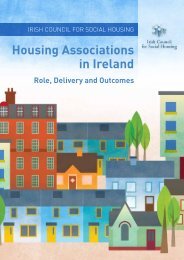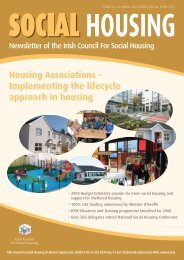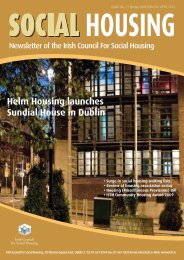National Housing Strategy for People with a Disability 2011 - 2016
National Housing Strategy for People with a Disability 2011 - 2016
National Housing Strategy for People with a Disability 2011 - 2016
You also want an ePaper? Increase the reach of your titles
YUMPU automatically turns print PDFs into web optimized ePapers that Google loves.
6.25 The Act provides powers <strong>for</strong> the Minister to make regulations governing themandatory provisions that a housing authority must include in their allocation scheme,including how dwellings are allocated to households, and the order of priority under whichdwellings are allocated to households. <strong>Housing</strong> authorities will determine their allocationpriorities on the basis of the profile of housing need in their areas allowing them, whereappropriate, to target housing support to groups <strong>with</strong> specific housing needs.6.26 A further important development 37 provides housing authorities <strong>with</strong> certain flexibilityin their allocations scheme to take account, where possible, of the location and preferencesof households, and is intended to introduce some element of choice <strong>for</strong> households into theallocations systems. This is a key issue <strong>for</strong> people <strong>with</strong> disabilities who may wish to livenear their families and support networks and close to any care services that they may beavailing of.6.27 Section 22 of the <strong>Housing</strong> (Miscellaneous Provisions) Act 2009, which provides <strong>for</strong> theallocation of dwellings by a housing authority, was commenced in June 2010, followingwhich authorities had one year to make a new allocation scheme. There<strong>for</strong>e, all housingauthorities were required to make a new allocation scheme by 13 June <strong>2011</strong>. The newscheme, which replaces the old scheme of letting priorities, must be in accordance <strong>with</strong> theprovisions set out in the Act, and <strong>with</strong> the Regulations which came into <strong>for</strong>ce on 1 May<strong>2011</strong>, 38 Under the old schemes of letting priorities, authorities had complete discretion as tohow households were prioritised <strong>with</strong>in those schemes, which meant that there was nostandardised approach as to how dwellings were allocated from authority to authority,including to people <strong>with</strong> disabilities. Furthermore, a variety of systems were used byauthorities in determining allocations, such as points based systems 39 , merit basedsystems 40 , time on list plus priority 41 , lottery system, choice based, etc.6.28 Creating a more uni<strong>for</strong>m approach to the content and operation of allocationschemes is something that will be developed further as part of the review of housing policy37Section 22(6) of the <strong>Housing</strong> (Miscellaneous Provisions) Act, 2009 provides that the allocation scheme mayinclude conditions subject to which the preference of a household to reside in a particular area or areas may betaken into account in allocating a dwelling to that household. The conditions include whether there are otherfamily members living in a particular area, whether the household has employment or is attending aneducation institution in a particular area or if they currently reside in a particular area.38Social <strong>Housing</strong> Allocation Regulations <strong>2011</strong> (S.I. No. 198 of <strong>2011</strong>)39Points were assigned in relation to the circumstances of the household (e.g. current accommodation,homelessness, children, disability) in order to rank the relative priority of households <strong>for</strong> housing supportagainst one another.40Each application was unique and considered on it own merits. It was a judgement-based system.41The main principle of this system was first come first served, however, some households were assessed at thetime of application as having a certain priority and were placed at the top of the list.70









